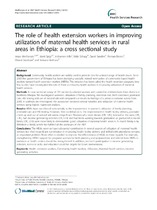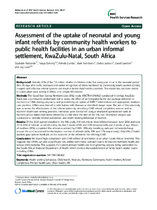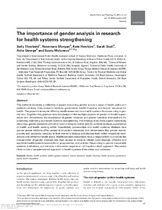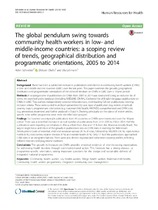The role of health extension workers in improving utilization of maternal health services in rural areas in Ethiopia: a cross sectional study
Date
2012Author
Medhanyie, Araya
Kifle, Yohannes
Schaay, Nikki
Sanders, David
Roman, Blanco
Dinant, Geertjan
Berhane, Yemane
Metadata
Show full item recordAbstract
BACKGROUND: Community health workers are widely used to provide care for a broad range of health issues. Since 2003 the government of Ethiopia has been deploying specially trained new cadres of community based health workers named health extension workers (HEWs). This initiative has been called the health extension program. Very few studies have investigated the role of these community health workers in improving utilization of maternalhealth services. METHODS: A cross sectional survey of 725 randomly selected women with under-five children from three districts in Northern Ethiopia. We investigated women’s utilization of family planning, antenatal care, birth assistance, postnatal care, HIV testing and use of iodized salt and compared our results to findings of a previous national survey from 2005. In addition, we investigated the association between several variables and utilization of maternal health services using logistic regression analysis. RESULTS: HEWs have contributed substantially to the improvement in women’s utilization of family planning, antenatal care and HIV testing. However, their contribution to the improvement in health facility delivery, postnatal check up and use of iodized salt seems insignificant. Women who were literate (OR, 1.85), listened to the radio (OR, 1.45), had income generating activities (OR, 1.43) and had been working towards graduation or graduated as model family (OR, 2.13) were more likely to demonstrate good utilization of maternal health services. A model family is by definition a family which has fulfilled all the packages of the HEP. CONCLUSIONS: The HEWs seem to have substantial contribution in several aspects of utilization of maternal health services but their insignificant contribution in improving health facility delivery and skilled birth attendance remains an important problem. More effort is needed to improve the effectiveness of HEWs in these regards. For example,strengthening HEWs’ support for pregnant women for birth planning and preparedness and referral from HEWs to midwives at health centers should be strengthened. In addition, women’s participation in income generating activities, access to radio and education could be targets for future interventions.
Collections
Related items
Showing items related by title, author, creator and subject.
-
Assessment of the uptake of neonatal and young infant referrals by community health workers to public health facilities in an urban informal settlement, KwaZulu-Natal, South Africa
Nsibande, Duduzile; Doherty, Tanya; Ijumba, Petrida; Tomlinson, Mark; Jackson, Debra; Sanders, David; Lawn, Joy (Biomed CentralBiomed Central, 2013)Background: Globally, 40% of the 7.6 million deaths of children under five every year occur in the neonatal period (first 28 days after birth). Increased and earlier recognition of illness facilitated by community health ... -
The importance of gender analysis in research for health systems strengthening
Theobald, Sally; Morgan, Rosemary; Hawkins, Kate; Ssali, Sarah; George, Asha S.; Molyneux, Sassy (Oxford University Press, 2017)This editorial discusses a collection of papers examining gender across a range of health policy and systems contexts, from access to services, governance, health financing, and human resources for health. The papers ... -
The global pendulum swing towards community health workers in low- and middle-income countries: A scoping review of trends, geographical distribution and programmatic orientations, 2005 to 2014
Schneider, Helen; Okello, Dickson; Lehmann, Uta (BioMed Central, 2016)BACKGROUND: There has been a substantial increase in publications and interest in community health workers (CHWs) in low- and middle-income countries (LMIC) over the last years. This paper examines the growth, geographical ...




